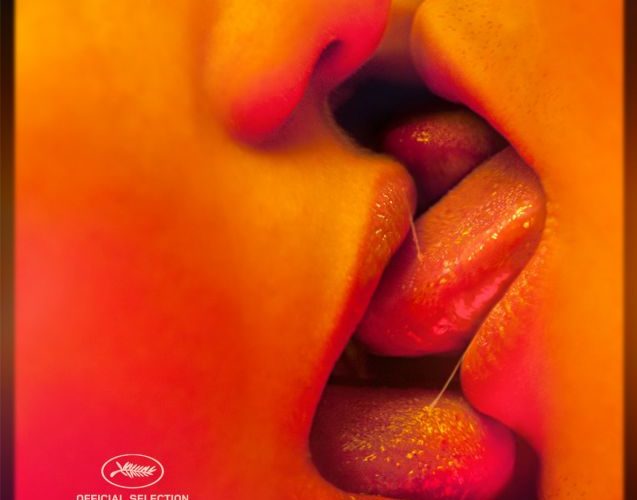Gaspar Noé, author of the notorious Irreversible and Enter the Void, has been generating a lot of hype around his fourth feature Love, which at Cannes was largely referred to as “Noé’s 3D porno” in the lead-up to its premiere as an out of competition midnight screening. Though highly divisive, his previous features had notable and undeniable merits that elevated them beyond mere succès de scandale. This latest one, on the other hand, is not much of a succès of any kind.
Following a wordless prelude depicting a couple masturbating each other until the guy comes (conspicuously, of the many orgasms that follow, not a single one is by a girl), the film cuts to Murphy (Karl Glusman), the guy from the intro, waking up hung-over in the apartment he shares with his girlfriend (Klara Kristin) and their two-year-old son. Through an interior-thought voice-over like the one from Enter the Void, he communicates how unhappy he is with his life and short flashbacks reveal that while cheating on his ex, Electra (Aomi Muyock), the condom broke, landing him in his current situation. The film then relocates to the start of Murphy’s relationship with Electra, charting its development and eventual dissolution.
The production values may be appreciably higher than your average porno but in terms of the quality of its plot, dialogue and performances, Love is not that far off. Murphy and Electra’s relationship revolves around little else than having sex, getting high and saying how much they love each other, which mainly translates to filling the dead time between intercourse with eruptions of jealousy and prolonged bouts of hysterical screaming. Their ceaseless declarations of love notwithstanding, indications of genuine affection are scarce to non-existent. Except for being remarkably convincing in bed, both actors, Muyock especially, are atrocious. The lines they are given even more so, and the film never manages to kindle any believable chemistry between them beyond the strictly sexual.
A large part of what distinguished Noé’s previous features was their cinematography. Disappointingly, despite again featuring Benoît Debie as DP and upgrading to 3D, Love’s visuals fail to live up to those of its predecessors. Debie’s famously weightless camera, which made exhilarating, seemingly impossible flights through space in Irreversible and Enter the Void as well as Harmony Korine’s Spring Breakers, is grounded this time. The lighting is dominated by the deep reds and greens of every Noé film, while the compositions are surprisingly unimaginative. In virtually every shot, the characters are foregrounded at the center of the frame, with the 3D accentuating their separation from their surroundings. Apart from the inevitable full-frontal cumshot and a handful of similarly showy and ridiculous effects (the viewer’s face gets jabbed by enormous dicks on three different occasions), this seems to be the 3D’s only purpose.
The sex scenes themselves, despite their explicitness, are depicted in a relatively tasteful if unadventurous manner, limited to static long takes from a small number of different positions, edited together in slow, blink-like cuts. Through artful lighting and positioning of bodies, a number of striking tableaux are achieved. In one early shot, the couple shares a post-coital joint while lying in a T-shape that spreads across the frame with Murphy resting his head on Electra’s stomach, every groove on their bodies gorgeously emphasized in chiaroscuro. Such images are often ravishing but they quickly lose their erotic impact through repetition and the sheer invariance eventually renders the sight of bodies humping oppressively tedious. The one saving grace is the soundtrack, as the sex is accompanied by a consistently amazing choice of instrumental tracks that range from classical (Bach and Satie), to atmospheric synth (John Carpenter), to experimental rock (John Frusciante and Pink Floyd), offering some compensation for the vigor lacking on screen.
Love endeavors to capture the ecstasy of love as expressed through sex, something that Murphy, a film student, proclaims as the most noble – and, supposedly, yet unrealized – of cinematic ambitions. By name-checking Pier Paolo Pasolini, Rainer Werner Fassbinder and Andy Warhol through Murphy’s t-shirts and film posters, Noé situates himself not only in the tradition of some of cinema’s most eloquent pioneers on the subjects of love and sex, but at its vanguard. Love doesn’t say nor show anything new. Arthouse fare featuring copious unsimulated sex and little else is hardly extraordinary any longer and Love actually belongs to the abortive tradition of such films as Michael Winterbottom’s equally ineffectual 9 Songs.
Love premiered at Cannes Film Festival and opens on October 30th. See our complete coverage below.




